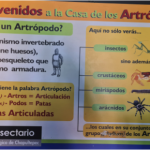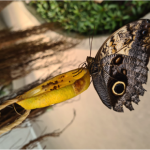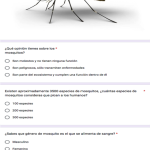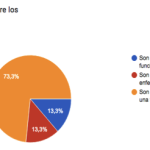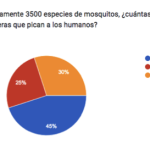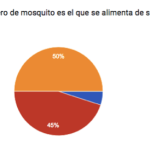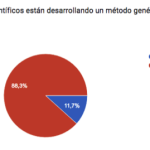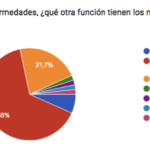PK – B – 26 “LA IMPORTANCIA DE LOS MOSQUITOS”
PK – B – 26 “LA IMPORTANCIA DE LOS MOSQUITOS”
Categoría: Pandilla Kids (3ro., 4to., 5to. y 6to. Año de primaria)
Área de participación: Biología
Resumen

Si el hombre fuera capaz de matar a todos los mosquitos del planeta, ¿sería tan malo para la Tierra?
Históricamente, el hombre no ha dado tregua en masacrar plagas de ratas, cucarachas, mosquitos y otras especies animales para mejorar la salud de sus poblaciones.
Se ha reforzado la posibilidad de una futura extinción de mosquitos (y no es que la extinción de especies sea una novedad para el ser humano), debido a que ciertos sectores vuelcan todos sus esfuerzos en terminar con éstos minúsculos seres.
Pero desde el punto de vista ambiental, ¿cuáles serían las consecuencias por la extinción de ciertas especies de mosquitos?
Pregunta de Investigación
¿Qué sucedería en el medio ambiente si los mosquitos se extinguieran?Planteamiento del Problema
Cada año los mosquitos matan con su picadura a 725.000 humanos. Infectan de malaria a más de 200 millones y apagan la vida de 450.000. Contagian con dengue a unos 60 millones de personas, de las que mueren 20.000, la mayoría niños. Miles de bebés están naciendo con microcefalia por causa del zika transmitido por el mismo mosquito que mata a 44.000 por fiebre amarilla. Por esas razones, los humanos hemos declarado la guerra a estos minúsculos seres. La agresión a nuestra especie es tan severa que consideramos exterminarlos, sin embargo desconocemos las afectaciones que el ecosistema sufriría.
Antecedentes
Es importante entender que cada vez que una especie desaparece se genera un desequilibrio en su ecosistema, ocasionando la muerte de otros animales o la superpoblación de otra especie, lo que hace que el espacio donde estos seres interactúan sufra grandes cambios que pueden incluso afectar a los seres humanos.
Objetivo
¿Cuáles serían las consecuencias de qué desaparecieran los mosquitos?
Justificación
Descubrí a éstos insectos desde que me provocaron picaduras muy molestas y dolorosas, desde ese momento me he preguntado: ¿por qué y para qué existen los mosquitos? y ¿si son importantes los mosquitos en el ecosistema?. Ya que los mosquitos son muy molestos, causan enfermedades y afectaciones a la salud humana.
Hipótesis
Si no existieran los mosquitos entonces se rompe la cadena alimenticia de algunos animales y se reduciría la polinización.
Método (materiales y procedimiento)
INVESTIGACIÓN DE CAMPO
REPORTE DE VISITA: Zoológico de Chapultepec (1ª Sección del Bosque de Chapultepec, Miguel Hidalgo, 11850, Ciudad de México)
- Insectario
- Mariposario
- Herpetario
Para mi proyecto asistí a las instalaciones del Insectario, Mariposario y Herpetario dentro del Zoológico de Chapultepec; con el fin de observar cuál es la interacción e importancia de los mosquitos en éstos grupos y ecosistemas.
En el Insectario, aprendí que los mosquitos pertenecen a los artrópodos y que existen muchas especies diferentes. Los artrópodos se caracterizan por tener dos antenas, seis patas y dos alas. Tienen el cuerpo dividido en tres partes: cabeza, tórax y abdomen; y por lo general cuando pasan a la etapa adulta, experimentan un cambio drástico llamado metamorfosis.
Un mosquito pertenece al Phylum Arthropoda, Clase Insecta, Subclase Pterygota, Orden Diptera, Suborden Nematocera, Infraorden Culicomorpha y Familia Culicidae. Los mosquitos son culícidos, sus larvas son acuáticas pero necesitan aguas estancadas porque respiran oxígeno atmosférico. Existen 3500 especies diferentes de mosquitos distribuidas por el mundo y no todas pican a los humanos.
En la visita al Mariposario, observé el proceso de polinización y la forma de alimentación, que es parecida a la de los mosquitos.
Todos los mosquitos, tanto si son machos o hembras, se alimentan del néctar de las flores e incluso del jugo de las frutas más dulces. En la cabeza tienen un aguijón en forma de trompa que usan para acceder a éstos alimentos (parecido al de las mariposas).
En el caso de las hembras, es la misma trompa la que sirve para picarnos. Las hembras necesitan ingerir sangre para desarrollar huevos y reproducirse. Según la especie, la toman de mamíferos o bien de aves, reptiles y otros animales. Sólo la hembra tiene unas piezas bucales especiales para perforar la piel.
Dentro del Herpetario, comprobé que los mosquitos forman parte de la alimentación de algunos reptiles y anfibios.
Los mosquitos depositan sus huevos en o cerca del agua, y ahí se desarrollan para formar larvas. Como su movilidad es limitada, son un alimento fácil para peces, ranas y salamandras. Pero también las larvas ayudan a filtrar materia orgánica en el agua, digiriendo hojas en descomposición y otros microorganismos, excretando nitrógeno y otros nutrientes que fomentan el crecimiento de plantas.
Por último, al salir del Bosque de Chapultepec, encontré una exposición en la Galería Abierta de las Rejas de Chapultepec llamada “#Animalística” del artista oaxaqueño Amador Montes.
Ahí estaba una obra en la que incluye a los mosquitos y me llamó mucho la atención, lleva por nombre “El Lago de las Típulas”. Lo que me mostró que también éstos insectos sirven de inspiración para crear arte.
INVESTIGACIÓN DOCUMENTAL
ENCUESTA
Realicé encuestas a un grupo aproximado de 60 personas, para tener su opinión sobre el tema y saber qué conocimientos tienen en algunos temas específicos sobre los mosquitos.
Estos fueron los resultados de cada pregunta:
Pregunta 1: ¿Qué opinión tienes sobre los mosquitos?
44 personas saben que los mosquitos son parte del ecosistema y tienen una función dentro del mismo, mientras que 16 personas no tienen buena opinión sobre estos insectos.
Pregunta 2: Existen aproximadamente 3500 especies de mosquitos, ¿cuántas especies de mosquitos consideras que pican a los humanos?
Pude notar que en éste concepto, existe poco conocimiento, 27 personas mencionaron que sólo 100 especies y 18 personas mencionaron que 300 especies son las que necesitan sangre como alimento. Sin embargo, son 200 especies que hacen de la sangre parte de su alimentación y 15 personas lo saben.
Pregunta 3: ¿Sabes qué género de mosquito es el que se alimenta de sangre?
27 personas saben que sólo las hembras necesitan sangre para desarrollar huevos y reproducirse, además de que son las únicas que tienen piezas bucales para perforar la piel. 30 personas mencionaron que ambos géneros se alimentan de sangre mientras que 3 personas dijeron que sólo los machos requieren sangre.
Pregunta 4: ¿Sabías que los científicos están desarrollando un método genético para erradicar mosquitos?
53 personas desconocen que un grupo de científicos desarrollaron una modificación genética para que los mosquitos sean estériles y así extinguir a ciertas especies.
Pregunta 5: Aparte de transmitir enfermedades, ¿qué otra función tienen los mosquitos?
En esta pregunta, dejé una opción abierta, las 4 personas que la usaron mencionaron no saber si los mosquitos cumplían otra función distinta a transmitir enfermedades y otras 4 personas restantes mencionaron que no tenían otra función. 52 personas eligieron las opciones correctas (ser alimento para otros insectos y animales además de ser polinizadores).
Resultados
La erradicación de cualquier especie está llena de efectos secundarios. Si desaparece una pieza de un ecosistema, éste se desequilibra. A veces colapsa por el cambio brusco de relaciones entre especies, pero la mayoría de las veces se acomoda a su nueva situación pasado un tiempo. De hecho, la mayoría de los ecólogos asegura que en poco tiempo el mosquito dejaría de echarse de menos y su función sería sustituida por otros insectos.
Si eliminamos la especie de mosquitos que son bebedores de néctar, la polinización de especies silvestres se vería afectada, pero no demasiado. Los cultivos comerciales no sentirían su ausencia, ya que se polinizan con abejas. Muchas aves, peces, murciélagos y anfibios que se alimentan de larvas de mosquitos morirían, pero sólo hasta que encontraran otra presa disponible.
Hay lugares, como el Ártico en primavera, donde acabar con ellos sería un alivio. Forman densas nubes que sirven de alimento a muchas aves. Su desaparición habría sido peligrosa hace unas décadas y la población de aves migratorias que anidan allí habría disminuido su población. Ahora el calentamiento global ha multiplicado su número hasta niveles insoportables.
Otros estudios han pronosticado un destino similar para varias especies de peces en el mundo, que tendría que adaptar su dieta para sobrevivir. Este escenario resultaría particularmente difícil para predadores especializados, como en el caso del pez mosquito.
De hecho, si los mosquitos llegaran a desaparecer, los otros insectos y peces que se alimentan de éstos reducirían sus números drásticamente, lo que provocaría un efecto dominó en toda la cadena alimenticia.
Sin embargo, otras investigaciones sugieren que mientras que algunos animales pasarían hambre, no sería un desastre. La mayoría terminaría por adaptarse a otras presa y la vida continuaría, sin las enfermedades provocadas por mosquitos.
Durante los últimos años los avances científicos, tecnológicos y sobre todo, genéticos nos están acercando al momento en que esa posibilidad de exterminar a los mosquitos pronto será una realidad. En apenas unas décadas se ha pasado de las pequeñas propuestas y discretos experimentos de laboratorio a poner en marcha diferentes planes. Florida aprobó un plan para liberar 750 millones de mosquitos modificados genéticamente, Australia inició un estudio piloto liberando 3 millones y hasta Google, mediante su filial científica Verily, ha anunciado su propio proyecto tras años de experimentación.
Los científicos han investigado un gran número de posibilidades para erradicar mosquitos, incluyendo un método genético que causa que los mosquitos produzcan proporcionalmente un mayor número de descendencia masculina. Con cada nueva generación en donde haya un mayor número de machos, las especies se auto limitarán.
Galería Resultados
Discusión
Por supuesto, no deberíamos olvidar que desde un punto de vista ambiental, la extinción de ciertas especies de mosquitos puede desarrollar consecuencias inciertas que deberían valorarse y estudiarse con mayor profundidad. No obstante, los mosquitos no son una pieza clave en la cadena alimentaria y la mayoría de los depredadores de los mosquitos tienen otras fuentes de alimento y puede que su desaparición apenas pueda afectarlos, aunque el biólogo Antonio Torralba menciona que es difícil de predecir el efecto concreto en las cadenas alimenticias.
Sabemos que existen numerosas especies, como murciélagos, pájaros, ranas y peces que se alimentan de mosquitos, pero en tiempos de escasez han demostrado su capacidad para adaptar sus dietas a otra clase de presas. Por ejemplo, las libélulas son grandes consumidoras de mosquitos (llegan a comer hasta 100 mosquitos en un solo día), es probable que ellas sí tengan que cambiar un poco sus dietas.
Por otra parte, los mosquitos tampoco despliegan un papel demasiado importante en la polinización, como sí puede suceder con otros insectos como abejas, mariposas o abejorros, por lo que tampoco supondría un gran problema en este sentido. Además tampoco necesitamos exterminar a todos los mosquitos. Existen más de 3.500 especies diferentes de mosquitos de los que tan solo los más conflictivos (unas 50 especies) estarían en punto de mira para su extinción.
Conclusiones
A pesar de que estos datos nos parezcan algo alarmistas, hay un aspecto importante que también nos señalan los científicos: el resto de las especies se adaptarían, habrían cambios, y los podríamos notar, pero nos acomodaríamos a esa falta mediante otras estrategias. No obstante, es algo que es mejor que no ocurra. Seguiremos odiándolos, mataremos los que entren a nuestra habitación y decidan beber nuestra sangre, pero definitivamente no vale la pena exterminar a los mosquitos. En este momento lo último que debería hacer el hombre es hacer más daño a otras especies. Cada día se extinguen docenas de especies, muchas de ellas ni siquiera las hemos conocido, y otras tantas desaparecen a causa de la acción humana. Esta sería la primera vez que extinguimos a propósito una especie en busca de mejorar la vida del ser humano.
Bibliografía
Clements, A.N. (1992) La biología de los mosquitos Volumen 1 Desarrollo, Nutrición y Reproducción. Londres: Chapman & Hall
Desconocido. (30 de Mayo de 2018). ¿Qué pasaría si los mosquitos desaparecieran?. Revista Muy Interesante. Sección Preguntas y Respuestas.
Montes, Carlos. (Abril de 2016). ¿Qué pasaría si los mosquitos se extinguieran?. El Ciudadano. Sección Animales/Tendencias.
Peláez, Javier. (3 de Marzo de 2022). Analicemos las ventajas e inconvenientes del plan para exterminar a los mosquitos. Yahoo! Noticias. Sección Noticias.
Valenzuela, América. (15 de Marzo de 2016). Así sería un mundo sin mosquitos. El Mundo. Sección Todología.
PK – B – 26 “LA IMPORTANCIA DE LOS MOSQUITOS”
PK – B – 26 “LA IMPORTANCIA DE LOS MOSQUITOS”
Summary

If man were able to kill all the mosquitoes on the planet, would it be so bad for the Earth?
Historically, man has been relentless in slaughtering plagues of rats, cockroaches, mosquitoes and other animal species to improve the health of their populations.
The possibility of a future extinction of mosquitoes has been reinforced (and it is not that the extinction of species is a novelty for human beings), due to the fact that certain sectors turn all their efforts to put an end to these tiny beings.
But from an environmental point of view, what would be the consequences of the extinction of certain species of mosquitoes?
Research Question
What would happen in the environment if mosquitoes became extinct?Problem approach
Every year, mosquitoes kill 725,000 humans with their bites. They infect more than 200 million people with malaria and kill 450,000. They infect some 60 million people with dengue fever, of whom 20,000 die, most of them children. Thousands of babies are being born with microcephaly because of Zika transmitted by the same mosquito that kills 44,000 with yellow fever. For these reasons, we humans have declared war on these tiny creatures. The aggression to our species is so severe that we consider exterminating them, but we do not know the effects that the ecosystem would suffer.
Background
It is important to understand that every time a species disappears, an imbalance is generated in its ecosystem, causing the death of other animals or the overpopulation of another species, which makes the space where these beings interact suffer great changes that can even affect human beings.
Objective
What would be the consequences of mosquitoes disappearing?
Justification
I discovered these insects since they caused me very annoying and painful bites, since then I have wondered: why and for what purpose mosquitoes exist? and if mosquitoes are important in the ecosystem? Since mosquitoes are very annoying, they cause diseases and affect human health.
Hypothesis
If mosquitoes did not exist, then the food chain of some animals would be broken and pollination would be reduced.
Method (materials and procedure)
FIELD RESEARCH
VISIT REPORT: Chapultepec Zoo (1st Section of the Chapultepec Forest, Miguel Hidalgo, 11850, Mexico City)
- Insectarium
- Butterfly Garden
- Herpetarium
For my project I went to the Insectarium, Butterfly Farm and Herpetarium at the Chapultepec Zoo in order to observe the interaction and importance of mosquitoes in these groups and ecosystems.
In the Insectarium, I learned that mosquitoes belong to the arthropods and that there are many different species. Arthropods are characterized by having two antennae, six legs and two wings. Their bodies are divided into three parts: head, thorax and abdomen; and usually when they reach the adult stage, they undergo a drastic change called metamorphosis.
A mosquito belongs to the Phylum Arthropoda, Class Insecta, Subclass Pterygota, Order Diptera, Suborder Nematocera, Infraorder Culicomorpha and Family Culicidae. Mosquitoes are culicidae, their larvae are aquatic but need stagnant water because they breathe atmospheric oxygen. There are 3500 different species of mosquitoes distributed throughout the world and not all of them bite humans.
During the visit to the Butterfly Farm, I observed the pollination process and the way they feed, which is similar to that of mosquitoes.
All mosquitoes, whether male or female, feed on the nectar of flowers and even the juice of the sweetest fruits. They have a sting on their head in the form of a trunk that they use to access these foods (similar to that of butterflies).
In the case of females, it is the same trunk that is used to sting us. Females need to ingest blood to develop eggs and reproduce. Depending on the species, they take blood from mammals or from birds, reptiles and other animals. Only the female has special mouthparts to pierce the skin.
Inside the Herpetarium, I found that mosquitoes are part of the diet of some reptiles and amphibians.
Mosquitoes lay their eggs in or near water, and there they develop into larvae. Because their mobility is limited, they are an easy food for fish, frogs and salamanders. But the larvae also help filter organic matter in the water, digesting decaying leaves and other microorganisms, excreting nitrogen and other nutrients that promote plant growth.
Finally, as I left the Bosque de Chapultepec, I found an exhibition at the Galería Abierta de las Rejas de Chapultepec called “#Animalística” by Oaxacan artist Amador Montes.
There was a work in which he includes mosquitoes and it caught my attention, it is called “El Lago de las Tipulas”. It showed me that these insects also serve as inspiration to create art.
DESK RESEARCH
SURVEY
I conducted surveys to a group of approximately 60 people, to get their opinion on the subject and to find out what knowledge they have on some specific topics about mosquitoes.
These were the results of each question:
Question 1: What is your opinion about mosquitoes?
44 people know that mosquitoes are part of the ecosystem and have a function within it, while 16 people do not have a good opinion about these insects.
Question 2: There are approximately 3500 species of mosquitoes, how many species of mosquitoes do you consider to bite humans?
I could notice that in this concept, there is little knowledge, 27 people mentioned that only 100 species and 18 people mentioned that 300 species are the ones that need blood as food. However, there are 200 species that make blood part of their food and 15 people know this.
Question 3: Do you know which mosquito genus is the one that feeds on blood?
27 people know that only females need blood to develop eggs and reproduce, plus they are the only ones that have mouthparts to pierce the skin. 30 people mentioned that both genders feed on blood while 3 people said that only males require blood.
Question 4: Did you know that scientists are developing a genetic method to eradicate mosquitoes?
53 people are unaware that a group of scientists developed a genetic modification to make mosquitoes sterile and thus extinguish certain species.
Question 5: Apart from transmitting diseases, what other function do mosquitoes have?
In this question, I left one option open, the 4 people who used it mentioned that they did not know if mosquitoes had a function other than transmitting diseases and the remaining 4 people mentioned that they had no other function. 52 people chose the correct options (being food for other insects and animals in addition to being pollinators).
Results
The eradication of any species is fraught with side effects. If a piece of an ecosystem disappears, it becomes unbalanced. Sometimes it collapses due to the abrupt change of relationships between species, but most of the time it settles into its new situation after a while. In fact, most ecologists assure us that in a short time the mosquito will no longer be missed and its function will be replaced by other insects.
If we eliminate the nectar-drinking species of mosquitoes, pollination of wild species would be affected, but not too much. Cash crops would not feel their absence, as they are pollinated by bees. Many birds, fish, bats and amphibians that feed on mosquito larvae would die, but only until they find other available prey.
There are places, such as the Arctic in spring, where wiping them out would be a relief. They form dense clouds that serve as food for many birds. Their disappearance would have been dangerous a few decades ago and the population of migratory birds nesting there would have declined. Now global warming has multiplied their numbers to unbearable levels.
Other studies have predicted a similar fate for several fish species around the world, which would have to adapt their diet to survive. This scenario would be particularly difficult for specialized predators, such as mosquitofish.
Indeed, if mosquitofish were to disappear, the other insects and fish that feed on them would reduce their numbers drastically, causing a domino effect throughout the food chain.
However, other research suggests that while some animals would starve, it would not be a disaster. Most would eventually adapt to other prey and life would continue, without the diseases caused by mosquitoes.
In recent years, scientific, technological and, above all, genetic advances are bringing us closer to the moment when the possibility of exterminating mosquitoes will soon be a reality. In just a few decades we have gone from small proposals and discreet laboratory experiments to the implementation of different plans. Florida approved a plan to release 750 million genetically modified mosquitoes, Australia initiated a pilot study releasing 3 million and even Google, through its scientific subsidiary Verily, has announced its own project after years of experimentation.
Scientists have investigated a number of possibilities for eradicating mosquitoes, including a genetic method that causes mosquitoes to produce proportionately more male offspring. With each new generation where there are more males, the species will become self-limiting.
Results Gallery
Discussion
Of course, we should not forget that from an environmental point of view, the extinction of certain mosquito species may develop uncertain consequences that should be further assessed and studied. However, mosquitoes are not a key part of the food chain and most mosquito predators have other food sources and their disappearance may hardly affect them, although biologist Antonio Torralba mentions that it is difficult to predict the concrete effect on food chains.
We know that there are many species such as bats, birds, frogs and fish that feed on mosquitoes, but in times of scarcity they have demonstrated their ability to adapt their diets to other kinds of prey. For example, dragonflies are large consumers of mosquitoes (they eat up to 100 mosquitoes in a single day), so it is likely that they will have to change their diets somewhat.
On the other hand, mosquitoes do not play a very important role in pollination, as other insects such as bees, butterflies or bumblebees do, so it would not be a big problem in this respect either. Nor do we need to exterminate all mosquitoes. There are more than 3,500 different species of mosquitoes, of which only the most problematic (about 50 species) would be targeted for extinction.
Conclusions
Although these data may seem somewhat alarmist to us, there is an important aspect that scientists also point out: the rest of the species would adapt, there would be changes, and we could notice them, but we would adapt to this lack by means of other strategies. However, it is something that is better not to happen. We will continue to hate them, we will kill the ones that come into our room and decide to drink our blood, but it is definitely not worth it to exterminate the mosquitoes. At this point the last thing man should do is to do more harm to other species. Every day dozens of species go extinct, many of them we have never even met, and many others disappear because of human action. This would be the first time that we purposely extinguish a species in order to improve human life.
Bibliography
Clements, A.N. (1992) The biology of mosquitoes Volume 1 Development, Nutrition and Reproduction. London: Chapman & Hall.
Unknown (May 30, 2018). What would happen if mosquitoes disappeared. Muy Interesante Magazine. Questions and Answers section.
Montes, Carlos (April 2016). What would happen if mosquitoes went extinct?. El Ciudadano. Animals/Trends section.
Peláez, Javier (March 3, 2022). Let’s analyze the pros and cons of the plan to exterminate mosquitoes. Yahoo! News. News section.
Valenzuela, America. (March 15, 2016). What a world without mosquitoes would look like. El Mundo. Section Todología.


